legislation
Latest

House Democrats want to step up the fight against robocalls
Some in Congress don't think the FCC's latest anti-robocall measures go far enough. Democrats in the House Committee on Energy and Commerce have put forward one bill and two drafts that would give further grief to spam callers. The fully formed bill, the HANGUP Act, would force federal debt collectors to get your permission before robocalling you. This had actually been part of the 1991 Telephone Consumer Protection Act, bill sponsor Rep. Anna Eshoo said, but the 2015 Budget Act rolled it back. She characterized these automated calls as harassment, whether it came from a government contractor or anyone else.

Senate bill would require clearly worded terms for online data privacy
Senators Amy Klobuchar (D-MN) and John Kennedy (R-LA) have introduced a new bill aimed at protecting consumers' online data privacy. They announced plans for such a bill earlier this month after Mark Zuckerberg testified before Congress. "Every day companies profit off of the data they're collecting from Americans, yet leave consumers completely in the dark about how their personal information, online behavior, and private messages are being used," Senator Klobuchar said in a statement. "Consumers should have the right to control their personal data and that means allowing them to opt out of having their data collected and tracked and alerting them within 72 hours when a privacy violation occurs and their personal information may be compromised. The digital space can't keep operating like the Wild West at the expense of our privacy."

Airbnb just opened an 'Office of Healthy Tourism'
In a bid to counteract tourist saturation in major cities around the world, Airbnb is opening a new global Office of Healthy Tourism. The move is designed to bring the economic benefits of tourism to small businesses and local residents in destinations off the beaten track, while lessening the burden on popular holiday hotspots.
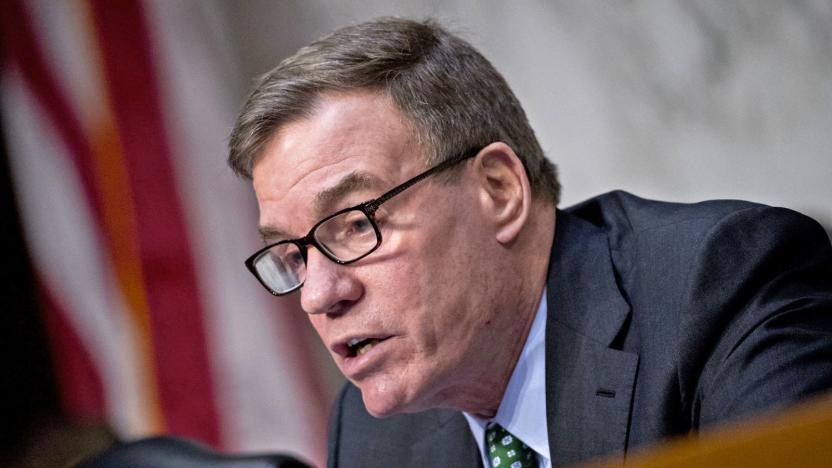
Lawmakers want more tech companies to address privacy legislation
Though Facebook has been in a bright spotlight since the Cambridge Analytica fallout, it's obviously not the only company that has to deal with issues surrounding how best to protect its users' privacy. That responsibility falls on all tech companies with online platforms and Congress is now calling on them to step up and do their part. In interviews with CNET, two congressmen express the need for Silicon Valley cooperation and urge executives to accept that this is an issue that isn't going away.
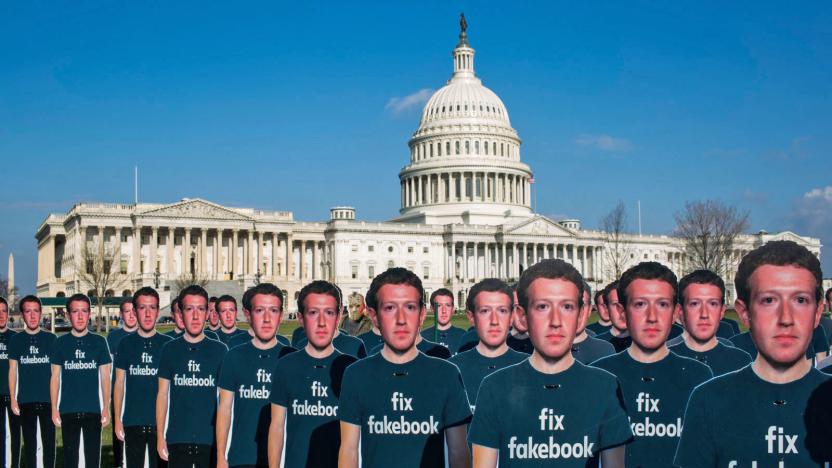
Facebook users aren’t changing their privacy settings, despite uproar
Since the Cambridge Analytica fallout, there have been demands for change, hearings and even a #DeleteFacebook campaign. But it turns out all of that hasn't really translated into any meaningful shift in Facebook users' behavior. The Wall Street Journal reports that over the past few weeks, Facebook users, for the most part, haven't changed their privacy settings despite the uproar against Facebook. "We have not seen wild changes in behavior with people saying I'm not going to share any data with Facebook anymore," Carolyn Everson, Facebook VP of global marketing solutions, said to the Wall Street Journal CEO Council this week.

Senators plan privacy legislation following Zuckerberg hearings
Following Mark Zuckerberg's hearings earlier this week, two Senators have announced legislation they plan to introduce regarding the protection of consumers' online data, 9to5Mac reports. Senators Amy Klobuchar (D-MN) and John Kennedy (R-LA) will propose regulations that would increase transparency, give consumers more control after their data has been breached and make sure companies like Facebook are working within privacy policies that protect consumers and their data. "The data breach at Facebook showed the world that the digital promised land is not all milk and honey. We've discovered some impurities in the punch bowl," Senator Kennedy said in a statement. "I don't want to regulate Facebook half to death, but there are things that need to be changed. Our bill will help protect Americans' online data fingerprint."
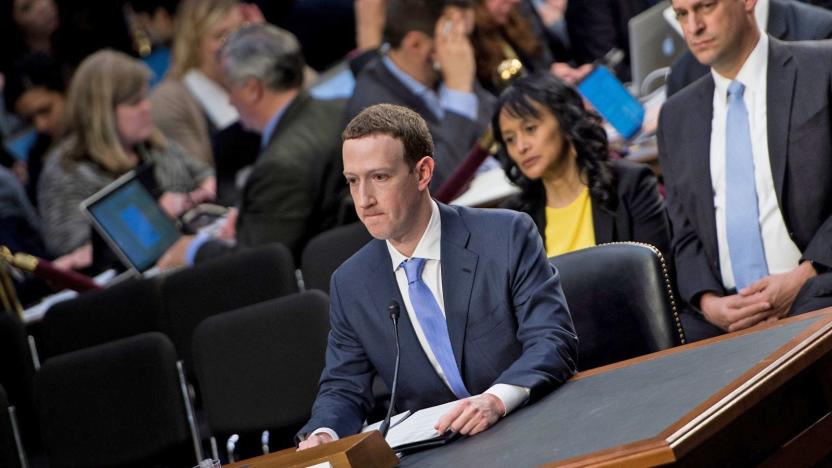
Facebook CEO pledges to work with Senate on proposed regulations
As Zuckerberg's Senate testimony continues, the question of regulation came up, as expected. Senator Lindsey Graham asked the CEO about his stance on legislation that would regulate platforms like Facebook and Zuckerberg said that if it was the right regulation, he and Facebook would welcome it. Additionally, Graham asked if Zuckerberg and his team would be willing to suggest some legislation regarding social media legislation and the CEO said he would send proposals to Graham's office.
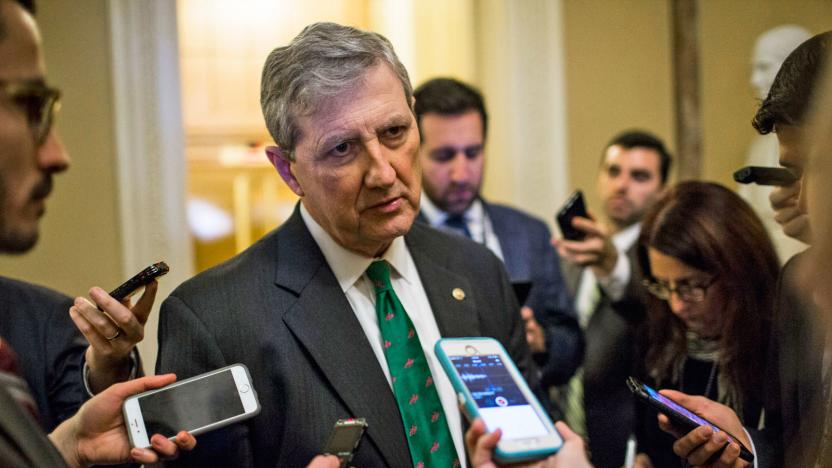
The Senate has its own insincere net neutrality bill
Now that the House of Representatives has floated a superficial net neutrality bill, it's the Senate's turn. Louisiana Senator John Kennedy has introduced a companion version of the Open Internet Preservation Act that effectively replicates the House measure put forward by Tennessee Representative Marsha Blackburn. As before, it supports net neutrality only on a basic level -- and there are provisions that would make it difficult to combat other abuses.

ESRB addresses loot box controversy with ‘in-game purchases’ label
The controversy over loot boxes in games like Star Wars: Battlefront II, Need for Speed: Payback and Destiny 2 hasn't settled and state legislators in the US and governments abroad are considering legislation that would limit their use or straight up ban them. Central to the debate is whether loot boxes should be considered gambling and in that regard, the ESRB has maintained that's not the case, saying last year, "While there's an element of chance in these mechanics, the player is always guaranteed to receive in-game content (even if the player unfortunately receives something they don't want)." But that hasn't kept people from pushing the ESRB to do more. New Hampshire Senator Maggie Hassan sent an open letter to the regulatory body earlier this month, asking it to review its policies on loot boxes and take into account their potential to do harm. And today, the ESRB announced what it will be doing to address concerns over loot boxes.

Oregon moves forward with its own net neutrality legislation
Oregon legislators just took a step towards protecting net neutrality in their state. The Oregon House of Representatives passed a proposal yesterday that would require state agencies to sign internet service contracts with providers that abide by net neutrality practices, meaning no blocking, throttling or paid prioritization. The bill now heads to the state Senate. While governors in Montana, New York, New Jersey, Hawaii and Vermont have signed executive orders that institute similar requirements on state agencies, a handful of states are pursuing comparable statutes through legislation.

Can legislation fix gaming's loot box problem?
Last year's gaming controversy has turned into this year's legislative battleground. Fans were outraged when Star Wars: Battlefront II launched with buyable loot boxes that unbalanced multiplayer combat, and other games like Need For Speed: Payback and Destiny 2 had their own pay-to-win controversies. Eventually, loot boxes unsettled enough constituents to rile their representatives. Legislators in Hawaii, Washington and Illinois have introduced bills to either study loot boxes or restrict access to young players, but how effective will they be? What else can lawmakers do?

US Senators want to give feds sole power to issue missile alerts
US senator Brian Schatz of Hawaii announced back in January that he wants take the responsibility of sending missile alerts away from state and local governments. Now he and fellow Senators Kamala Harris and Cory Gardner have introduced a legislation that would give feds the sole authority to send out missile threat notifications. Under the bill, called Authenticating Local Emergencies and Real Threats (ALERT) Act, the Department of Defense would be able to send notifications to the public using the same system US Presidents use to issue warnings in the event of national catastrophes.

Washington state bill would make hard-to-repair electronics illegal
A number of states are considering right to repair bills, legislation which if passed would make it easier for individuals and repair shops to replace or repair electronics parts. Repair.org reports that 17 states have already introduced bills this year and while most aim to make repair parts and manuals accessible, Washington's proposed legislation would straight up ban electronics that prevent easy repair. "Original manufacturers of digital electronic products sold on or after January 1, 2019, in Washington state are prohibited from designing or manufacturing digital electronic products in such a way as to prevent reasonable diagnostic or repair functions by an independent repair provider," says the bill. "Preventing reasonable diagnostic or repair functions includes permanently affixing a battery in a manner that makes it difficult or impossible to remove."

South Korea may ban cryptocurrency trading amid fears of tax evasion
In a move that's sent bitcoin spiralling, officials in South Korea have announced plans to ban cryptocurrency trading in the country, though it would take time before such a ban in implemented. The plans come against a backdrop of concerns regarding tax evasion, as cryptocurrency trading in the country is highly speculative and similar to gambling. Many currencies, such as bitcoin and ether, are priced much higher in South Korea's exchanges than elsewhere in the world. Industry data provider CoinMarketCap has even begun excluding some South Korean exchanges in its calculations "due to extreme divergence in prices from the rest of the world".

Drunk droning in New Jersey could land you in prison
The law is pretty firm when it comes to drunk driving -- and the consequences are obvious. Now, officials are turning their attention to drunk droning. New Jersey has just approved a bill that, if signed by Governor Chris Christie, would make it illegal to fly one under the influence of drugs or alcohol.
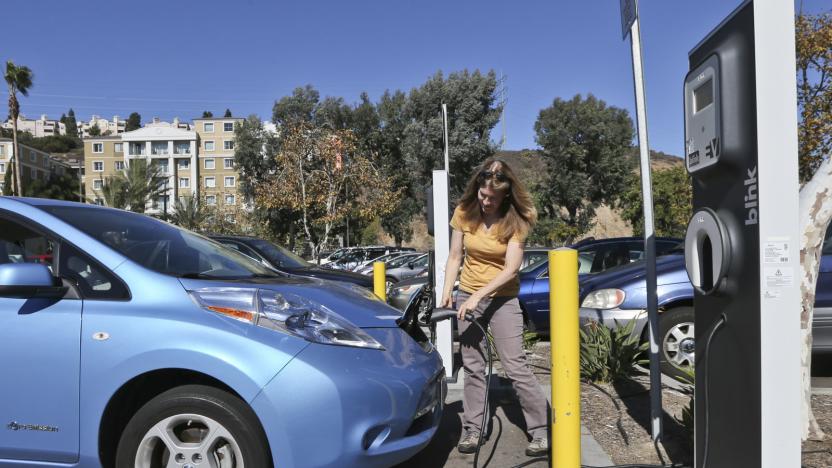
California bill would ban new fossil fuel vehicles from 2040
Under a new bill introduced this week, every single new car sold in California after 2040 would be an emission-free vehicle. The bill, introduced by San Francisco Assemblyman Phil Ting, is in line with Governor Jerry Brown's goal for 1.5 million zero-emission cars on the state's roads by 2025.

Proposed net neutrality bill would ban blocking and throttling
Last week, the FCC repealed net neutrality protections put in place in 2015 and returned broadband to a Title I classification. There were many voices expressing concern over the proposal and frustration once the FCC voted to enact it and a few members of Congress on both sides of the aisle stated that legislation, which would be more permanent than an FCC ruling, would ultimately be the best way forward when it comes to net neutrality. Now, less than a week after the FCC's vote, Republican Representative Marsha Blackburn has introduced a net neutrality bill.

NSA surveillance expansion bill moves to House for a vote
Intelligence officials might not get the permanent surveillance powers they're looking for, but they could get some key concessions all the same. The House Intelligence Committee has passed the FISA Amendments Reauthorization Act of 2017 in a partisan 12-8 vote, clearing it for an eventual vote in the House of Representatives. The bill is ostensibly about renewing the FISA Amendments Act's Section 702 for 4 years, but it also expands the list of eligible spying targets.

UK bill would give police the power to seize drones
The UK doesn't just want to institute rules governing how you fly your drone -- it wants to give police more power to take drones out of commission. A newly unveiled Drone Bill would give law enforcement the authority to order pilots to not only order operators to ground drones, but to seize drone parts if needed to prove that the machine was used to break the law. If someone's caught flying a drone over a prison, officers could both force the robotic flier down and confiscate it to illustrate what happened.
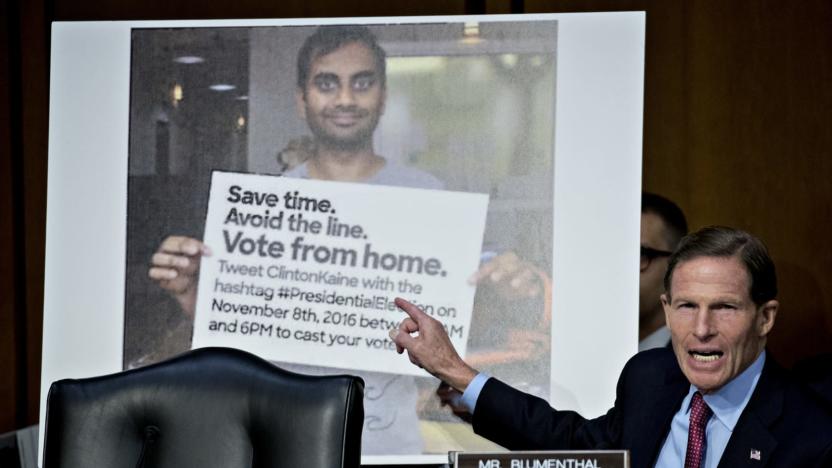
Senators want FEC to improve transparency for online political ads
It's not just companies like Google asking the Federal Election Commission to improve disclosure for online political ads. A group of 15 Democrat senators (led by Sens. Claire McCaskill, Amy Klobuchar and Mark Warner) has filed an official comment calling on the FEC to take "immediate action" increasing the transparency for internet political ads. Russia took advantage of exemptions in political ad law to influence the 2016 presidential election without revealing its involvement, the senators argued, and that could be "the norm" if the Commission doesn't step in. Internet ads should be scrutinized just as closely as their TV and radio counterparts, according to the senators.




